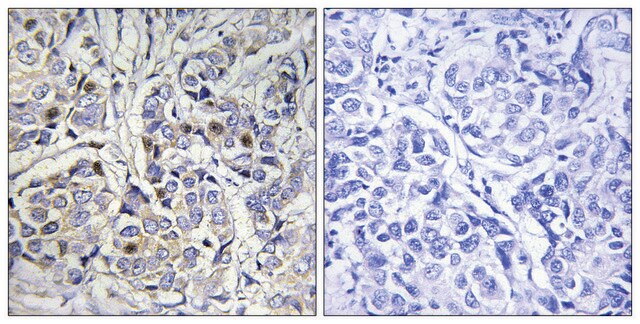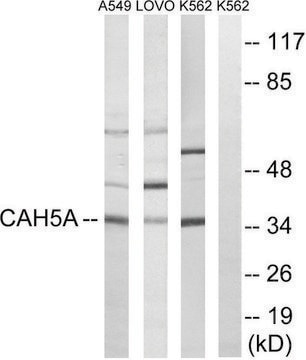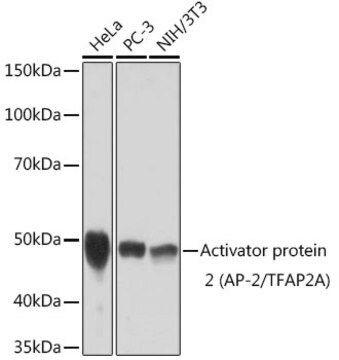추천 제품
생물학적 소스
mouse
Quality Level
결합
unconjugated
항체 형태
purified immunoglobulin
항체 생산 유형
primary antibodies
클론
A6/2/2, monoclonal
형태
buffered aqueous solution
분자량
antigen ~50 kDa
종 반응성
human
농도
~1.0 mg/mL
기술
immunohistochemistry: suitable
western blot: 2-4 μg/mL using G361 total cell extract
동형
IgG1
UniProt 수납 번호
배송 상태
dry ice
저장 온도
−20°C
타겟 번역 후 변형
unmodified
유전자 정보
human ... TFAP2A(7020)
일반 설명
Adaptor protein-2 (AP2) is a key constituent of clathrin-coated vesicles that mediates the endocytosis of cell membrane components such as G protein-coupled receptors (GPCRs). AP2 is a heterotetramer that consists of α, β, μ and σ subunits which bind to tyrosine- and dileucine-based motifs on membrane-associated cargo proteins.
Monoclonal Anti-AP2 (mouse IgG1 isotype) is derived from the hybridoma A6/2/2 produced by the fusion of mouse myeloma cells and splenocytes from BALB/c mice immunized with a peptide corresponding to amino acids of human AP2α. In humans and mice, the adaptor protein-2 (AP2) family comprises five different transcription factors namely AP2α, AP2β, AP2 γ, AP2δ, and AP2ε. These proteins contain N-terminal transactivation domain and C-terminal helix-span-helix motif, which together with a central basic region facilitates dimerization and DNA binding.
면역원
peptide corresponding to amino acid 415-433 of human AP2α.
애플리케이션
Monoclonal Anti-AP2 antibody produced in mouse has been used in:
- immunofluorescence staining
- immunoblotting
- immunohistochemistry
생화학적/생리학적 작용
Adaptor protein-2 (AP2) expression is associated with the embryonic development. AP2β was found to be a tumor specific human telomerase reverse transcriptase (hTERT) promoter activator, suggesting it may be a biomarker for cancer diagnosis or as a cancer therapeutic target for inhibiting hTERT activity and tumor cell growth. In humans, mutations or loss of these genes result in increased tumor growth and metastasis. Specifically, AP2α loss causes down regulation of E-cadherin and matrix metallopeptidase 9 (MMP-9) activity, which in turn enhance tumorigenicity of colon cancer cells. This effect may also be the result of AP2α regulation by p53.
물리적 형태
Solution in 0.01 M phosphate buffered saline, pH 7.4, containing 15 mM sodium azide.
면책조항
Unless otherwise stated in our catalog or other company documentation accompanying the product(s), our products are intended for research use only and are not to be used for any other purpose, which includes but is not limited to, unauthorized commercial uses, in vitro diagnostic uses, ex vivo or in vivo therapeutic uses or any type of consumption or application to humans or animals.
적합한 제품을 찾을 수 없으신가요?
당사의 제품 선택기 도구.을(를) 시도해 보세요.
Storage Class Code
10 - Combustible liquids
Flash Point (°F)
Not applicable
Flash Point (°C)
Not applicable
시험 성적서(COA)
제품의 로트/배치 번호를 입력하여 시험 성적서(COA)을 검색하십시오. 로트 및 배치 번호는 제품 라벨에 있는 ‘로트’ 또는 ‘배치’라는 용어 뒤에서 찾을 수 있습니다.
Roles of telomeres and telomerase in cancer, and advances in telomerase-targeted therapies
Jafri MA, et al.
Genome Medicine, 8(1), 69-69 (2016)
Loss of AP-2alpha results in deregulation of E-cadherin and MMP-9 and an increase in tumorigenicity of colon cancer cells in vivo.
Schwart B, et al.
Oncogene, 26(28), 4049-4049 (2007)
AP-2alpha and AP-2gamma are transcriptional targets of p53 in human breast carcinoma cells
Li H, et al.
Oncogene, 25(39), 5405-5405 (2006)
Tumor-specific activation of human telomerase reverses transcriptase promoter activity by activating enhancer-binding protein-2$\beta$ in human lung cancer cells
Deng WG, et al.
The Journal of biological chemistry, 282(36), 26460-26470 (2007)
Short mitochondrial ARF triggers Parkin/PINK1-dependent mitophagy.
Grenier K, Kontogiannea M, and Fon EA
The Journal of Biological Chemistry, 289(43), 29519-29530 (2014)
자사의 과학자팀은 생명 과학, 재료 과학, 화학 합성, 크로마토그래피, 분석 및 기타 많은 영역을 포함한 모든 과학 분야에 경험이 있습니다..
고객지원팀으로 연락바랍니다.







